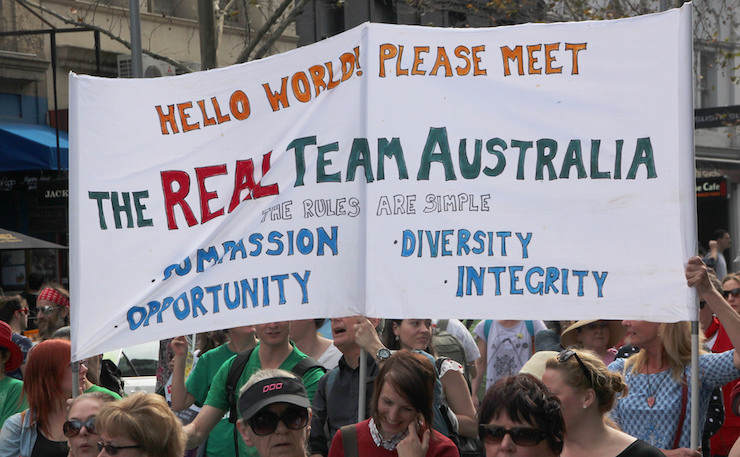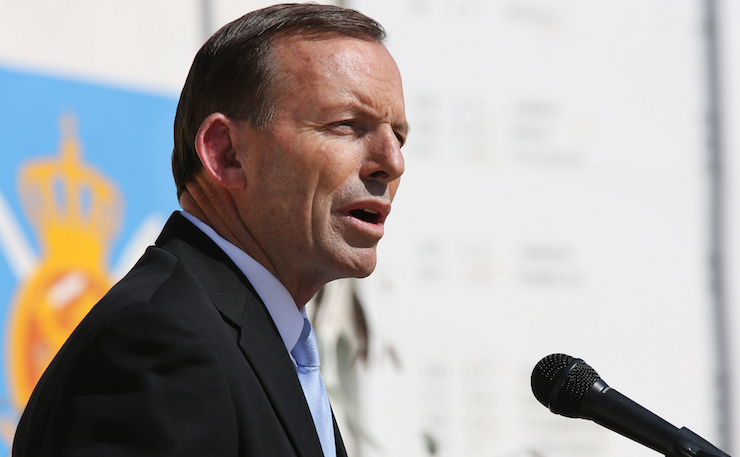Looking back on the year in politics makes clear the enormity of Malcolm Turnbull’s task in 2016, writes Ben Eltham.
The great French historian Fernand Braudel once wrote that time could be divided into three categories: geographical, social, and individual.
Geographical time was the long sweep of the aeons: the “almost changeless” history of humanity in relation to its surroundings. Social time was also long and deep, “a history of gentle rhythms, of groups and groupings … economies and states, societies and civilisations.” Lastly, and perhaps of least interest, Braudel wrote there is individual time: the traditional “history of events” that we have come to believe is the causal chain of political happenstance.
Braudel thought that this kind of history, made up of battles and treaties and princes, wasn’t worth that much. It was “ultrasensitive” – “the slightest movement sets all its gauges quivering.” Ultimately, the follies of monarchs and the triumphs of generals were merely “a surface disturbance, the waves stirred up by the powerful movement of tides.” Indeed, Braudel argued, the truth was that “statesmen were, despite their illusions, more acted upon than actors.”
I was reminded of these thoughts today, as I sat down to write a review of Australian politics in 2015. For 2015 was a year when it was increasingly obvious that Australia’s political leaders were largely acted upon, rather than actors. For all their illusions –and there have been few harbouring more illusions than Tony Abbott – 2015 revealed a nation and a political class increasingly at the mercy of global events over which they had little control.
2015 was also a year in which the great sweep of geographical time collided with individual time, in a way that it is increasingly clear that most politicians and ordinary citizens can simply not comprehend.
On a prosaic level, this was most apparent at this month’s historic climate summit in Paris, when more than 190 nations signed an agreement to try and limit the irreversible warming of the earth to a level compatible with civilisation. The jury is very much out over whether the provisions of the COP21 agreement can deliver such safety. But the very fact that the world’s statesmen and stateswomen agreed that human action was changing the geological basis of human existence is surely a moment of devastating clarity for the human race. Or, at least, it should be.
One of this year’s most important books, Naomi Klein’s This Changes Everything, made precisely this point. In a long essay elsewhere, I have argued that Klein is naïve in her belief in the ability of scattered protest movements to effect lasting political and economic change. But there can be no doubt that she grasps the centrality of climate change as the single greatest issue of the 21st century, indeed perhaps of all subsequent human generations. Klein’s book draws freely on an even better (and much more pessimistic) book on climate, Kari Norgaard’s Living in Denial. It’s a book I’d like to see all of Australia’s political class forced to read.
But they probably won’t, because after all the key point about the politics of climate in this country, perhaps simply politics in general, is that politicians are unable to face up to the broader reality confronting them.
I’ve spent umpteen hours writing articles about the smoking ruins of Australian climate policy under the Coalition, and there is no doubt that current policies cannot deliver the emissions reductions Australia has just promised in Paris (let alone the full decarbonisation urgently required to save the planet). But, while Labor’s climate credentials are demonstrably better than the Coalition’s, it’s also worth remembering that currently Labor has no credible carbon reduction policy on the table.
Both the major parties also remain committed to the massive Carmichael mine in Queensland, a mine that, if built, will single-handedly eclipse nearly all of Australia’s planned carbon reductions in future years. Labor also remains wedded to the idea that Australia should continue to explore and develop new fossil fuel projects. It’s hard to imagine a crazier denial than a political class committed to digging up more coal, even as the glaciers melt and the seas expand and rise.
It’s testimony to the increasingly fractured and incoherent nature of public debate in Australia’s democracy that the Paris agreement was not seen as the humiliating defeat for the Coalition that it actually was. In any longer perspective, COP21 was far and away the most important event in Australian political life this year. It signals the decline and eventual fall of big resource industries as the most profitable and visible parts of Australia’s economy. In this, it could be said to mark the beginning of the end of Australia’s two century-old model of extractive capitalism.
Ian McAuley has written a fine article today in which he explores the implications for our nation of the coming fossil fuel transition. The mining boom is well and truly over, $100 billion has been wiped from the books of big resource companies, and employment in the sector is contracting.
The China-driven resources boom was a one-off – it won’t be repeated in anything like the same way in future decades. Hundreds of billions of dollars invested in mining and resource mega-projects look to have been squandered, as have tens of billions of windfall tax revenues, which have not been re-invested in the things that might drive future economic growth, like education and innovation.
You can see a straw in the wind in Western Australia, a shooting star of the federation that is now rapidly falling to earth. Perth’s once-booming real estate market is contracting with it: house prices are falling, and rental vacancies are at a 20-year high. The broader Australian economy is doing okay, of course, but the longer-term trends of a warmer and carbon-constrained world make the Lucky Country one of the most vulnerable in the OECD to the economic and environmental impacts of decarbonisation and dangerous warming.
McAuley concludes that “we still have second-rate policymakers and managers, most of whom don’t realise that the ‘settler society’ days are over.”
Nowhere was that brute truth more obvious than in the one essential “event” in Australian politics of 2015: the extraordinary implosion of Tony Abbott.

The fall of Abbott taught us many things, including about the disastrous judgment and overweening incaution of the man himself. But it was mainly a lesson in the triumph of structural instabilities in Australian politics over the undoubted determination of a strong individual leader.
Abbott’s downfall was the result of errors and miscalculations. But it was also a fascinating lesson in the bounds of acceptable policy discourse in Australia, and a demonstration of the value ordinary voters still place in the residual protections of Australia’s increasingly threadbare social democracy.
In many ways, and not just the obvious one, Abbott was a throwback as prime minister. In a quite self-consciously Whitlamite way he attempted to reshape Australian society in his own conservative image. Riffing off the radical neoliberalism off his culture warrior friends, Abbott made his prime ministership an exercise in tearing at the fabric of Australian society. In the endless culture wars as well as their disastrous 2014 budget, Abbott and Hockey served up a vision of Australia that was meaner, nastier and more unequal. Voters rejected it.
It was crash though or crash, and Abbott crashed quickly and spectacularly. He spent less time in office than either Julia Gillard, Kevin Rudd or Gough Whitlam, let alone his supposed hero John Howard, who by the end of his reign had turned decisively against him.
Abbott was a deeply flawed political leader. He fought battles he didn’t need to, punishing enemies and alienating neutrals with his thirst for political combat. He showed disastrous judgment, time and time again: from backing Joe Hockey’s first budget, to bringing back knighthoods, to his increasingly unhinged penchant for macho militarism.
His main achievements were negative: abolishing the carbon tax and rending great holes in the welfare safety net. At times whole industries were fair game, as renewable energy and auto manufacturing were judged ideological enemies, and punished accordingly. In doing so, Abbott acted manifestly against the national interest, and ultimately even against his own self-interest, as the rapid collapse of his own party support demonstrated.
Abbott’s great mistake was to believe that by force of will he could somehow drag Australia backwards into a whiter, less liberal, more conservative time and place. But Australia in 2015 is not Australia in 1965. More than a quarter of us were born overseas, the traditional model of the family has mutated, and the verities of religion have been disenchanted. Australians in 2015 are more accepting than ever of gender diversity, of queer sexuality and of the questioning of expert opinion. We may not be comfortable with an atomised and increasingly vicious lived experience online, but that won’t stop us ordering an Uber or engaging in vigorous conversation on social media.
Against these deeper social trends, no leader, no matter how charismatic, could have prevailed in a conservative adventure. And Abbott was never charismatic. He was energetic and strong-willed, but also dogmatic, abrasive and by the end of his leadership, increasingly paranoid.
At the close of the year Abbott strikes a diminished figure, shopping his warmed-over messages of clashing civilisation to the Murdoch newspapers and to right-wing talking shops around the world. In doing so, he’s managed to break one more promise: that he wouldn’t snipe and destabilise once deposed.
Meanwhile, the man that has replaced him, Malcolm Turnbull, enjoys a honeymoon that is already demoralising Labor. It shouldn’t: Turnbull’s honeymoon may well evaporate in the new year. No more than Abbott, Turnbull can’t solve the structural problems that bedevil his government.
A budget in structural deficit; a decarbonising world; a more and more unequal society; the strange ‘secular stagnation’ of advanced economies; a leaky tax base that can’t manage to tax pollution or corporate profit: these are just some of the major problems any prime minister must confront. It’s not immediately apparent that Turnbull has answer to any of them. Faced with this conundrum, Turnbull’s best tactic seems to be about projecting sunny optimism, and looking busy. This is a vision of Australian government as a glorified state administration, making sure the hospitals don’t run out of money and the trains run more or less on time.
The pull of history’s rip is tremendous. As Braudel observed, once the tide starts running, there is little that even a strong swimmer can do about it.
Donate To New Matilda
New Matilda is a small, independent media outlet. We survive through reader contributions, and never losing a lawsuit. If you got something from this article, giving something back helps us to continue speaking truth to power. Every little bit counts.





